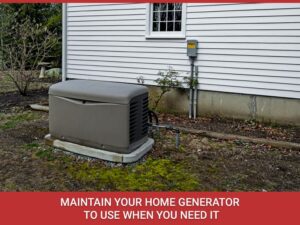 People relying on alternative power sources for emergency usage often forget the periodic maintenance needed to keep the source in its best condition. You shouldn’t be overlooking this as standby generators play a crucial role in supplying power when weather or other situations lead to power outages.
People relying on alternative power sources for emergency usage often forget the periodic maintenance needed to keep the source in its best condition. You shouldn’t be overlooking this as standby generators play a crucial role in supplying power when weather or other situations lead to power outages.
You may be using a home generator occasionally, so you may forget to do regular maintenance activities. But you would never want to experience a scenario when that emergency supply source fails to produce power when you need it the most. Maintaining your generator is essential for both its usage and longevity.
How to Maintain A Home Generator?
Taking care of your generator doesn’t need you to be an engineer. By periodically checking your machine in specific areas and parameters, you can keep it fit and running for several years without spending excess money on repairs and maintenance. Let’s discuss some important areas and steps that can help you use your priced investment for years.
Check the Operator Manual
If you do not have access to the operator’s manual, you may obtain one through the company’s website. Every manufacturer publishes basic steps that guide users to maintain their generator at home. You may even consult the company that installed your generator to help you get the manual.
Test Early
Testing early is the best approach to keep adverse conditions or potential damages at bay. Checking your generator before an event is a good way forward. Manuals provide checklists and timelines to complete the regular maintenance operations. On average, you should check and run your generator at least once every month. It allows you to check its running condition and will enable you to address possible operation issues proactively.
Keep It Clean
You should keep your generator clean and ensure dust, dirt, or even rodents don’t invade any part of the generator. If birds or a mouse builds a nest near the air intake or exhaust, there is a high risk of causing fire to the generator when it gets hot when operating. You would never want your generator to catch fire, especially when you need it for emergency usage.
Know The Fuel Type
In most cases, propane is the fuel choice unless a natural gas supply is available. In portable generators, diesel fuels are commonly used. But using gasoline isn’t recommended as it significantly raises the safety risks. If it comes in contact with any hot part of the generator, there is a possibility of an explosion. Most fuel suppliers outline the risks associated with using the fuels they supply. They can provide specific information regarding the safety of using a particular fuel to power your generator.
Ventilation
Keeping your generator well-ventilated is a crucial safety measure. You need to keep it in an open area as it generates carbon monoxide that is odorless and is often deadly if someone inhales it in significant amounts.
Standby generators are great investments as they prevent expensive losses during a power failure. Like any other equipment, it’s essential to know how you can safely operate and maintain your equipment to ensure it functions properly and is safe for your family when used.
If you are searching for a reliable service for maintaining your diesel generators in Central Florida, you may contact Mid Florida Diesel. They have been providing their services for over 25 years. Their experienced team helps residents periodically to maintain and repair their diesel generators. Besides these services, they also supply fuel to households for powering their generators.
Picture Credit: iStock
